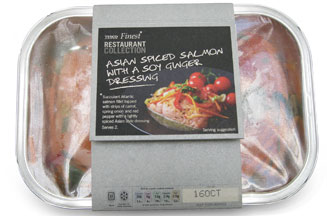
When Tesco launched a discount range this time last year, it was probably not expecting a brisk recovery of its premium lines. Sales of its upmarket products, however, have risen sharply, prompting the supermarket to add Restaurant Collection, a selection of ready meals, to its Finest range.
The worst of the recession might have passed; people are certainly willing to pay more for their food, if the performance of Tesco's organic and Finest lines is anything to go by. With the start of this recovery, however, there may be an attendant danger that consumers will shun upmarket ready meals in favour of dining out.
Mark Ritson, associate professor of marketing and a columnist for Marketing, says the launch of the Restaurant Collection should not be used as a bellwether for the economy; it is instead a sign of greater consumer segmentation. 'It simply means a very small proportion of consumers want to pay a bit more for high-quality restaurant-style food at home,' he adds. 'Compared with the alternative - eating out at a restaurant - this is a classic recessionary product. It might cost more than other items in Tesco, but it's a third of the price of having the same meal on the high street.'
Ritson adds that the supermarket's launch of the ready meals is probably in reaction to increased sales in the premium sector. 'Tesco will have seen its premium customers paying more for restaurant-type products and national brands, and clearly thinks its Finest line can mop up this demand and maybe grow it a bit, too,' he says.
He does, however, question the retailer's marketing strategy of trying to push premium products while maintaining its positioning as 'Britain's biggest discounter'. The result is mixed messages. 'Had Restaurant Collection been launched in 2001, I would have called it a total success, but these days there is less certainty as to whether Tesco knows what it is doing,' argues Ritson.
Tesco has launched the ready meals, which include Beef Wellington and Duck Confit, into a crowded 'dine-in' category. Earlier this month, Waitrose brought out a 'gastro meal kit' that promised to make cooking from scratch easier. The supermarket has also reported a 32% year-on-year increase in sales of cookery books, indicating that more of its customers, at least, are eating in.
According to Mintel, the bad news for Tesco is that ready meals face tough competition from meal kits and ready-to-cook food, which give consumers a degree of control over what goes into their supper. Mintel does, however, expect the ready meal market to continue to grow.
Tony Treacy, managing director of retail agency Ideas to Market, believes the product category with the biggest potential is the one that helps people cook at home from scratch. He adds that the positioning of Restaurant Collection is counter-intuitive. 'The sub-range positioning [as part of the Finest line] will be confusing to consumers, as they won't really understand how it differs from Finest,' he says. 'Restaurant Collection also raises questions about the quality of the meals already produced by Tesco.'
Treacy also delivers a warning to Tesco's new product development team. 'They are going to run out of superlatives to label their ready meals,' he says. 'There is no longevity with the promise they are offering consumers.'
Restaurant Collection, the branding for which was created by Honey Creative, is clearly aimed at those consumers who purchase groceries from across the pricing spectrum. Gwyn Burr, customer director at Sainsbury's, says supermarkets have driven this trend with their own-label products. 'Sainsbury's customers are mixing and matching, buying Taste the Difference as well as Basics products,' she adds. 'Savvy customers know how to stretch their budget.'
Sainsbury's has made a success of illustrating to consumers, largely through its 'Try Team' activity, how to cook meals from scratch. Tesco's approach to home dining may be different, but with premium sales performing strongly, it will be hoping that Restaurant Collection adds a touch of class to the TV dinner.

